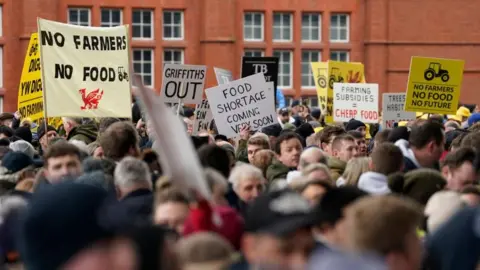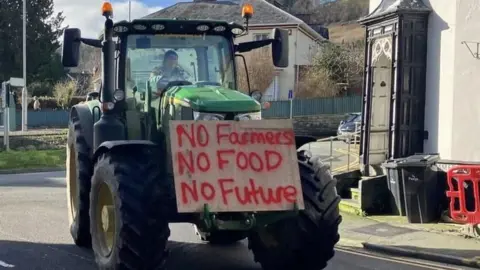New farming subsidy absolutely right, minister says
 PA Media
PA MediaA new flagship farming policy is "absolutely the right scheme", according to Wales' agriculture minister.
Speaking ahead of its launch, Huw Irranca-Davies said he was "hopeful it will land to a good reception", even though he conceded "there will be the odd person" who wished it had been done differently.
The second iteration of the Sustainable Farming Scheme (SFS) and the rate of payment farmers can expect for joining it is due to be announced next week, after unions and farmers rejected the original scheme, staging protests.
Those plans included a requirement for farmers to plant trees on 10% of their land to qualify for subsidies, but they claimed that could lead to huge job cuts.
Farming union NFU Cymru want "at least the same level of stability to farm business, rural communities and supply chains" as the current scheme, known as the Basic Payment Scheme.
The Welsh government has been holding roundtable discussions with farming leaders, as well as environmental and nature campaigners, to revise the plan which it hopes will make farming businesses sustainable and help to reach its 2030 climate and nature targets.
Irranca-Davies, Wales' deputy first minister and secretary for rural affairs and the environment, said the final scheme was "the result of more than 12 months of intense work" involving farming unions, meat, livestock and dairy sectors as well as environmental groups "to get the balance".
Although he would not give any detail about the scheme, he told BBC Politics Wales it was "going to be unlike anything else that's been delivered in the UK".
"It'll be a whole farm approach and a whole nation approach that delivers for the people of Wales," he said.
"They want to see farming that produces good food to high animal welfare standards and also does the right thing for the environment."
The minister would not commit to publishing an impact assessment of the final iteration as he said work was ongoing.
The assessment of the first iteration of the scheme predicted a fall in livestock numbers, while unions claimed the data also suggested thousands of jobs could be lost.
This interpretation was contested by the government and environment groups.
As 80% of Wales' landscape is under the care of farmers, the government also argued they have a key role to play in helping the effort to tackle climate change and the losses in nature.

NFU Cymru president Aled Jones said it was "imperative that the revised scheme and budget attached to the SFS avoids such a shocking impact on one of Wales' iconic sectors".
"The SFS must work for all farming sectors and areas of Wales and help ensure that Welsh farming can continue to underpin the £9.3bn food and farming supply chain," he said.
Asked about the impact assessment, Irranca-Davies said his "feeling was that it'll be better" for both "viable farm businesses and environmental benefits as well".
Again refusing to pre-empt the announcement, he said there would be mitigations in order to ensure those in agriculture would not be left behind as Wales moves towards a greener economy with "real subtleties" within the scheme that would be delivered.
Plaid Cymru's Delyth Jewell MS said: "I think there has been frustrations for a long time that lots of people in the farming community feel they haven't been heard.
"We have to make sure - these are people who sustain our lives - we need to make sure their lives are made sustainable too."
Conservative Senedd leader Darren Millar MS said he wanted to see the policy voted on by politicians to ensure "democratic legitimacy" for the plan.
"We've got to make sure that the new scheme has food security at its heart, and that it will actually deliver the sustainable future for our farmers that they need," he said.
